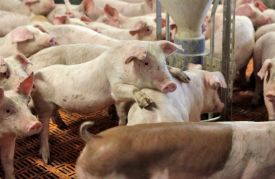Agriculture, Estonia, Legislation, Markets and Companies
International Internet Magazine. Baltic States news & analytics
Thursday, 18.04.2024, 02:27
Closing Ekseko in Estonia would cause chain reaction making thousands of people suffer
 Print version
Print version |
|---|
"It would mean a catastrophe for about 40% of Estonian pig farming, because that is how many pigs we produce," said Tuvi. According to him, around 280,000 piglets are born in the Ekseko farm, 50,000 of whom are grown up there, too.
"230,000 pigs are sent out to other farms in Estonia, of which there are a total of 25," said Tuvi, who added that if the strict restrictions are imposed, according to which Ekseko can no longer export animals, all these farms will remain empty. Also all sows and piglets whom Ekseko could not place anywhere would have to be executed.
"If we have to stop our production here because of restrictions, then it is not a joking matter, because in our system 200 people work, and the pig farming is associated to the fodder industry, transport companies, pharmaceutical companies, fodder additives production, and so on," said Tuvi.
In his opinion, restricting the activities of one big farm would cause a lengthy chain reaction due to which thousands of people would suffer.
Estonian Food and Veterinary Office (FVO) said on Tuesday that additional tests confirmed that the African swine flu has reached a fourth farm in Estonia; the Baltic states biggest pig farm Ekseko that is located just a few kilometres away escaped narrowly the strictest restriction zone for now but the EU can set certain extra requirements with its decisions, for example export restrictions to the uninfected farms that are in the vicinity of infected farms, like Ekseko is. It can take anywhere from two weeks to a couple of months for the European Commission to announce its decision.








 «The Baltic Course» Is Sold and Stays in Business!
«The Baltic Course» Is Sold and Stays in Business!

